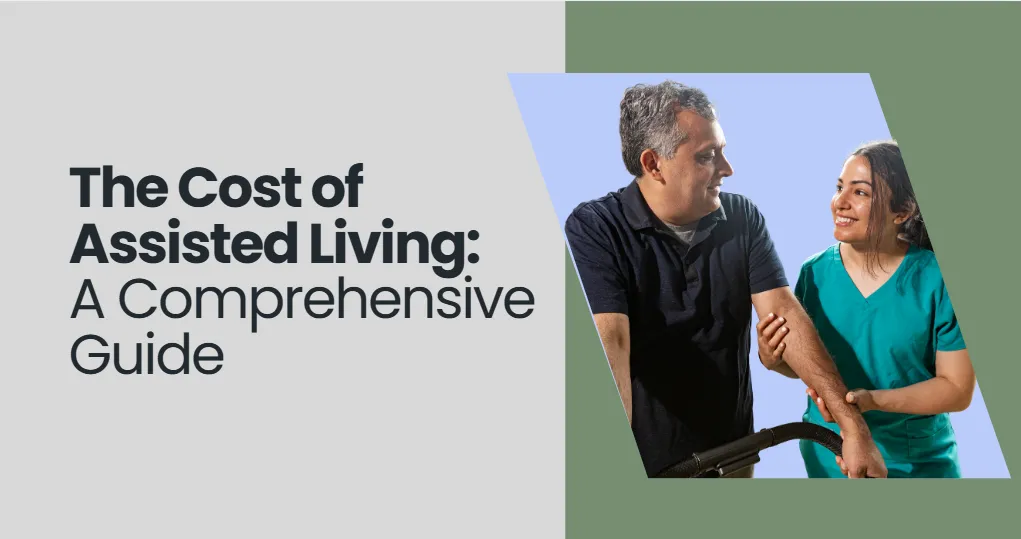
The Cost of Assisted Living: A Comprehensive Guide
When an elderly parent’s health began to decline, the decision was made to transition them into assisted living. However, the adult child quickly discovered that understanding assisted living costs was far more complicated than expected. The base housing fees were just the beginning—additional costs for personal care, therapy, and other services quickly added up.
Hidden charges and unexpected fees caused further stress and confusion. Eventually, they explored options for financing assisted living, such as Medicaid and long-term care insurance, which helped ease the financial burden. With a clearer understanding of the costs, they were able to navigate the process more effectively, ensuring their loved one received the proper care without sacrificing financial stability.
In this blog, I will discuss the key factors to consider when assessing assisted living expenses and how to manage them effectively.
Understanding the Costs of Assisted Living
The cost of assisted living is often a combination of multiple factors. It is essential to understand how these costs are determined and what to expect when searching for an assisted living facility. By having a clear understanding of what makes up the overall price, families can make more informed decisions and avoid unexpected financial burdens.
Base Rate for Housing
The base rate for assisted living usually covers the essential services a resident needs, such as a private or shared living space, daily meals, and access to communal areas. This rate is the starting point, and it can vary widely based on location, the size of the living space, and the level of care required.
In general, the base rate will be the primary ongoing expense for assisted living. This fee will be the most significant part of the monthly cost. The base rate might range from $2,500 to $4,500 per month, depending on the facility and its location. Larger cities tend to have higher base rates due to the increased demand for services and amenities, whereas rural areas typically offer more affordable options.
Fees for Extra Services
While the base rate provides for basic care and services, there are often additional fees for extra services. These fees may be charged on top of the base rate and will depend on the level of assistance your loved one needs.
For example, if your loved one requires specialized medical care, extra staff support, or regular physical therapy, there will be an additional charge for these services. Many facilities offer personalized care plans based on the individual needs of the resident. The cost for extra services typically ranges from $100 to $500 or more per month.
Some facilities offer specialized programs for residents who require memory care or have chronic conditions like Alzheimer's or Parkinson's. These programs often have a higher price tag due to the need for specialized staff and equipment, which can raise the overall cost of care.
Costs for Optional Services
In addition to essential and extra services, assisted living facilities may offer a range of optional services that allow residents to further modify their living experience. These can include:
Housekeeping services (additional cleaning)
Transportation to appointments or outings
Beauty and salon services
Fitness programs or classes
These optional services are not included in the base rate, but they are valuable for families who want to confirm that their loved one has a fulfilling, comfortable lifestyle. Depending on the facility, these optional services may be billed at à la carte prices or offered in packages, usually ranging from $50 to $300 per month.
Potential One-Time Fees
When moving into an assisted living community, there may be one-time fees that come with the transition. These fees can include:
Admission or move-in fees
Community entrance fees
Pet deposits
Damage deposits
These fees generally range from $500 to $5,000, depending on the facility and the services provided. While some facilities charge a move-in fee, others may include it as part of the overall cost of residency. Understanding these one-time charges is essential for families to plan and budget for their loved one's transition.
What about Medicare or Medicaid?
A common question among families is whether Medicare or Medicaid can help cover the costs of assisted living. While both programs offer support for seniors, they have different rules and regulations about what is covered.
Medicare
Medicare is a government health insurance program primarily for seniors aged 65 or older. However, Medicare does not cover the cost of assisted living itself. While it may cover specific health-related services, such as hospital stays or skilled nursing care, it does not typically cover long-term care or personal assistance services offered in an assisted living setting.
Medicaid
On the other hand, Medicaid can be a valuable resource for seniors who meet specific financial criteria. Medicaid can help cover the costs of long-term care, including in assisted living facilities, in certain circumstances. Each state has its own rules regarding Medicaid and assisted living, so it’s important to check the specific eligibility requirements and benefits in your state. Medicaid may cover:
Room and board in a facility for eligible individuals
Personal care services
Medical care is provided within the facility.
Because Medicaid eligibility is based on income and assets, it may not be available to all seniors. Families should consult with a Medicaid planner or financial advisor to see if their loved one qualifies.
Read the Assisted Living Contract
Before committing to an assisted living facility, it’s essential to carefully review the contract and understand the terms and conditions. This will help avoid unexpected surprises and give you clarity on what is included in the cost.
Review Services and Fees
The contract should clearly outline the services included in the monthly fee as well as any additional services that may incur extra charges. Be sure to review these details thoroughly, as the cost breakdown can sometimes be unclear at first glance.
Clarify Payment Terms
Understanding the payment terms is essential. Some facilities may require a security deposit, while others may request payment in full for a certain period. Be sure to ask questions about any upfront costs and the payment schedule to avoid confusion later on.
Ask About Contract Renewal
Find out whether the contract has an automatic renewal clause. Some facilities may offer long-term agreements, so it’s essential to know if and when the contract will need to be renewed. Ask about increased costs when renewing contracts and find out whether there are any penalties for early termination.
Seek Clarification
If any part of the contract is unclear, be sure to ask for clarification. This will help confirm that you fully understand what is included in the cost and what could potentially incur extra charges.
Understanding Assisted Living Costs Over Time
Potential Cost Increases: Care needs often grow over time, leading to higher costs for additional services like medical care or therapy.
Reviewing Payment Policies: Regularly review payment policies to stay ahead of potential changes and avoid surprises with fees.
Assessing Level of Care: Reassess your loved one’s health periodically to confirm the care level meets their needs and understand how changes may impact costs.
Conclusion
Understanding the costs of assisted living is essential for planning a smooth transition for your loved one. By carefully considering the various fees, potential services, and long-term financial impact, you can make a more informed decision that aligns with both your loved one’s needs and your budget.
Financing assisted living options, such as Medicaid or long-term care insurance, can provide valuable support in managing these costs. Taking the time to research, plan, and understand all the available options will help confirm that you choose the best facility for care, comfort, and peace of mind. Remember, assistance is available to guide you through the complexities of assisted living—reach out to professionals who can provide clarity on the financial aspects of care.
FAQs
How are assisted living costs determined?
Assisted living costs are primarily based on location, level of care needed, and room type (private vs. shared). Additional factors like amenities, specialized memory care, and medication management can significantly increase monthly expenses beyond the base rate.
What financial help is available for assisted living?
Medicaid may cover some costs for qualifying low-income seniors, while veterans can access VA benefits like Aid & Attendance pensions. Long-term care insurance, reverse mortgages, and life insurance conversions are other potential funding sources worth exploring.
Are there hidden fees in assisted living contracts?
Many facilities charge extra for move-in fees, special activities, or increased care needs that aren't included in the base rate. Always request a detailed breakdown of all potential charges before signing any contract.
How do I know if a facility is cost-effective?
Compare what services are included in the base rate versus what cost extra at different facilities. Consider both current needs and potential future care requirements when evaluating overall value and affordability.
What's the long-term financial impact of assisted living?
Costs typically increase 3-5% annually and may jump significantly if more intensive care is needed. Creating a multi-year financial plan that accounts for inflation and potential care changes is crucial for long-term affordability.
Ready to explore your assisted living options? Contact us today to get expert guidance and find the best solutions for your loved one’s care!

Facebook
Instagram